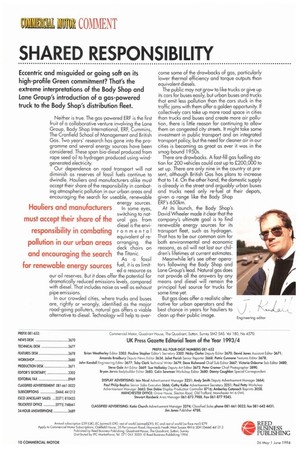SHARED RESPONSIBILITY
Page 12

If you've noticed an error in this article please click here to report it so we can fix it.
Eccentric and misguided or going soft on its high-profile Green commitment? That's the extreme interpretations of the Body Shop and Lane Group's introduction of a gas-powered truck to the Body Shop's distribution fleet.
Neither is true. The gas-powered ERF is the first fruit of a collaborative venture involving the Lane Group, Body Shop international, ERF, Cummins, The Cranfield School of Management and British Gas. Two years' research has gone into the programme and several energy sources have been considered. These span bio-diesel produced from rape seed oil to hydrogen produced using windgenerated electricity, Our dependence on road transport will not diminish as reserves of fossil fuels continue to dwindle. Hauliers and manufacturers alike must accept their share of the responsibility in combating atmospheric pollution in our urban areas and encouraging the search for useable, renewable energy sources.
In some eyes, switching to natural gas from diesel is the environmental equivalent of re
arranging the deck chairs on the Titanic.
As a fossil fuel, it is as limited a resource as our oil reserves. But it does offer the potential for dramatically reduced emissions levels, compared with diesel. That includes noise as well as exhaust pipe emissions.
In our crowded cities, where trucks and buses are, rightly or wrongly, identified as the major road-going polluters, natural gas offers a viable alternative to diesel. Technology will help to over
come some of the drawbacks of gas, particularly lower thermal efficiency and torque outputs than equivalent diesels.
The public may not grow to like trucks or give up its cars for buses easily, but urban buses and trucks that emit less pollution than the cars stuck in the traffic jams with them offer a golden opportunity. If collectively cars take up more road space in cities than trucks and buses and create more air pollution, there is little reason for continuing to allow them on congested city streets. It might take some investment in public transport and an integrated transport policy, but the need for cleaner air in our cities is becoming as great as ever it was in the smog-bound 1950s.
There are drawbacks. A fast-fill gas fuelling station for 200 vehicles could cost up to £200,000 to set up. There are only nine in the country at present, although British Gas has plans to increase that to 14. On the other hand, the domestic supply is already in the street and arguably urban buses and trucks need only re-fuel at their depots, given a range like the Body Shop ERF's 650km.
At its launch, the Body Shop's David Wheeler made it clear that the company's ultimate goal is to find renewable energy sources for its transport fleet, such as hydrogen. That has to be our common aim for both environmental and economic reasons, as oil will not last our children's lifetimes at current estimates.
Meanwhile let's see other operators following the Body Shop and Lane Group's lead. Natural gas does not provide all the answers by any means and diesel will remain the principal fuel source for trucks for some time yet. But gas does offer a realistic alternative for urban operators and the best chance in years for hauliers to clean up their public image.
























































































